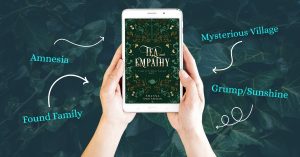writing, Books
Tired of Tropes?
by
One of the hot topics in the writing world lately has been tropes. These are familiar story elements that you see in many works. They’re the sort of thing you look at as a reader and say, “Oh, I like that.”
Some examples include things like friends to lovers, enemies to lovers, marriage of convenience, grump/sunshine (in which one member of the couple is kind of a grouch and the other is more sunny, often bringing about emotional healing for the grump).
Most of the more common examples come from the romance world, but some fantasy ones I can think of include the Chosen One (the hero is the subject of some sort of destiny or prophecy), the Lost Heir (the farmboy/kitchen assistant who’s the rightful heir to the throne, sometimes also a Chosen One), the Unlikely Hero (ordinary person is in the wrong place at the wrong time and has to carry out some heroic task), You’re a Wizard! (person discovers they have magical powers), and Portal to a Magical World (people from our world visit a fantasy world — think Narnia).
There’s been a lot of discourse among writers about whether this emphasis on tropes is good or bad. They’re a big part of “writing to market,” in which you find out what things are popular and write that, and in marketing. Letting readers know that the things they like are in your books helps them know what books they might want. Tropes are a big element in what’s hot on TikTok, but book graphics showing the tropes in a book have been popular all over social media, like this one I did for Tea and Empathy:

On the other hand, there are starting to be complaints about books that feel like they’re basically a bunch of tropes stuck together without any depth and about readers who treat the trope list as a checklist, so they only read the books with their chosen trope. There are writers who focus their writing one one popular trope, since that’s what their readers want.
I like the idea of getting information to help me find books that have things in them that I like, but the things I’d look for tend to be a lot more complicated than you can get in one of those trope graphics. For instance:
- The road trip/quest adventure in which characters gradually become friends or fall in love as they face adversity together.A
- December-set romantic comedy that’s not explicitly a Christmas book, but that just happens to have some of those vibes as a backdrop to the story.
- The Worst/Best Thing — the worst thing that can happen in a person’s life may also be the best because they wouldn’t have reached their full potential otherwise (think the movie Titanic. Being on the Titanic was probably the worst thing that could happen to Rose, but if it hadn’t happened, her life would have been very different)
- In Another Time/Place — people meet in different timelines/realities and are always drawn to each other, though in some of these there are complications (this isn’t the same as Fated Mates because it’s not really about fate or destiny in which they have no choice about being together, but rather that they’re so perfectly suited for each other that no matter when or where they meet, they’ll fall in love)
- So Bad at It That They’re Actually Good — when someone who seems like a failure at something (usually magic) turns out to actually be really good at some related thing, and they were only failing because they were trying to do something that didn’t fit their abilities. In fantasy, it’s usually the failed student wizard who turns out to be able to do a rare kind of magic no one else can do that uses a different kind of power and skill than regular magic.
Try fitting those into a hashtag!
I don’t think there’s any harm in fitting things you and readers love into your books, in letting readers know about the elements that are in your books, or in looking for elements you love when choosing what to read. I just worry about readers who only want to read one thing or writers who feel constrained into writing only one thing because that’s what their readers want. I can barely write one subgenre for more than a few books without going stir crazy. That may be why I’m only moderately successful rather than making the big bucks. Of course, people are free to read what they want to read, but it seems weird to me to not only limit yourself to one genre, but to one kind of story in one genre. That would be like reading the same book over and over again. I’m also not fond of the idea of boiling a whole story down to one element. I have a list of things I look for and get excited about when I find them (sometimes it’s a pleasant surprise when they come up in a book and I wasn’t expecting them), but that’s not all I read.
